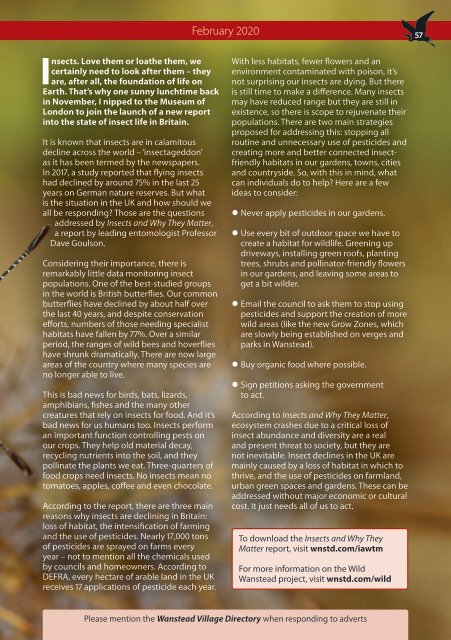February 2020
Create successful ePaper yourself
Turn your PDF publications into a flip-book with our unique Google optimized e-Paper software.
<strong>February</strong> <strong>2020</strong><br />
57<br />
Insects. Love them or loathe them, we<br />
certainly need to look after them – they<br />
are, after all, the foundation of life on<br />
Earth. That’s why one sunny lunchtime back<br />
in November, I nipped to the Museum of<br />
London to join the launch of a new report<br />
into the state of insect life in Britain.<br />
It is known that insects are in calamitous<br />
decline across the world – ‘insectageddon’<br />
as it has been termed by the newspapers.<br />
In 2017, a study reported that flying insects<br />
had declined by around 75% in the last 25<br />
years on German nature reserves. But what<br />
is the situation in the UK and how should we<br />
all be responding? Those are the questions<br />
addressed by Insects and Why They Matter,<br />
a report by leading entomologist Professor<br />
Dave Goulson.<br />
Considering their importance, there is<br />
remarkably little data monitoring insect<br />
populations. One of the best-studied groups<br />
in the world is British butterflies. Our common<br />
butterflies have declined by about half over<br />
the last 40 years, and despite conservation<br />
efforts, numbers of those needing specialist<br />
habitats have fallen by 77%. Over a similar<br />
period, the ranges of wild bees and hoverflies<br />
have shrunk dramatically. There are now large<br />
areas of the country where many species are<br />
no longer able to live.<br />
This is bad news for birds, bats, lizards,<br />
amphibians, fishes and the many other<br />
creatures that rely on insects for food. And it’s<br />
bad news for us humans too. Insects perform<br />
an important function controlling pests on<br />
our crops. They help old material decay,<br />
recycling nutrients into the soil, and they<br />
pollinate the plants we eat. Three-quarters of<br />
food crops need insects. No insects mean no<br />
tomatoes, apples, coffee and even chocolate.<br />
According to the report, there are three main<br />
reasons why insects are declining in Britain:<br />
loss of habitat, the intensification of farming<br />
and the use of pesticides. Nearly 17,000 tons<br />
of pesticides are sprayed on farms every<br />
year – not to mention all the chemicals used<br />
by councils and homeowners. According to<br />
DEFRA, every hectare of arable land in the UK<br />
receives 17 applications of pesticide each year.<br />
With less habitats, fewer flowers and an<br />
environment contaminated with poison, it’s<br />
not surprising our insects are dying. But there<br />
is still time to make a difference. Many insects<br />
may have reduced range but they are still in<br />
existence, so there is scope to rejuvenate their<br />
populations. There are two main strategies<br />
proposed for addressing this: stopping all<br />
routine and unnecessary use of pesticides and<br />
creating more and better connected insectfriendly<br />
habitats in our gardens, towns, cities<br />
and countryside. So, with this in mind, what<br />
can individuals do to help? Here are a few<br />
ideas to consider:<br />
• zNever apply pesticides in our gardens.<br />
• zUse every bit of outdoor space we have to<br />
create a habitat for wildlife. Greening up<br />
driveways, installing green roofs, planting<br />
trees, shrubs and pollinator-friendly flowers<br />
in our gardens, and leaving some areas to<br />
get a bit wilder.<br />
• zEmail the council to ask them to stop using<br />
pesticides and support the creation of more<br />
wild areas (like the new Grow Zones, which<br />
are slowly being established on verges and<br />
parks in Wanstead).<br />
• zBuy organic food where possible.<br />
• zSign petitions asking the government<br />
to act.<br />
According to Insects and Why They Matter,<br />
ecosystem crashes due to a critical loss of<br />
insect abundance and diversity are a real<br />
and present threat to society, but they are<br />
not inevitable. Insect declines in the UK are<br />
mainly caused by a loss of habitat in which to<br />
thrive, and the use of pesticides on farmland,<br />
urban green spaces and gardens. These can be<br />
addressed without major economic or cultural<br />
cost. It just needs all of us to act.<br />
To download the Insects and Why They<br />
Matter report, visit wnstd.com/iawtm<br />
For more information on the Wild<br />
Wanstead project, visit wnstd.com/wild<br />
Please mention the Wanstead Village Directory when responding to adverts

















